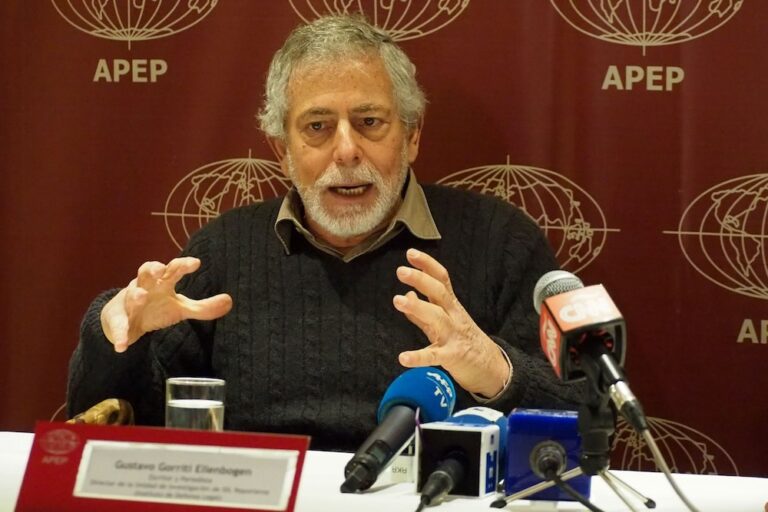(IPYS/IFEX) – The Military Justice Supreme Council (CSJM), the judicial body of the Peruvian armed forces, accused journalists, who are members of the Prensa Libre Association of having used false documents to base their accusation that the Military Intelligence Service (SIE) played a role in political espionage. CSJM’s complaint was submitted to the National Elections […]
(IPYS/IFEX) – The Military Justice Supreme Council (CSJM), the judicial body
of the Peruvian armed forces, accused journalists, who are members of the
Prensa Libre Association of having used false documents to base their
accusation that the Military Intelligence Service (SIE) played a role in
political espionage.
CSJM’s complaint was submitted to the National Elections Jury (JNE), and was
then transferred to the office of the attorney general. Prensa Libre
Association journalists are accused by the CSJM of several crimes, in
accordance with the criminal code. The journalists are said to have
falsified documents, which outlined SIE orders that potential presidential
candidates Alberto Andrade Carmona and Luis Castañeda Lossio, were to be
followed.
On 25 August 1999, during its first public appearance in a press conference,
the Prensa Libre Association – composed of Anel Townsend, Roxana Cueva, Luis
Iberico, María Elena Belaunde, Iván García, and others – presented documents
and films that proved that the opposition was being followed by members of
the intelligence service.
Subsequently, the CSJM reported that, after the press conference, it
arranged for an official examination of the documents and came to the
conclusion that they were false.
According to the results of this brief investigation, carried out by Álvaro
Castro Osores, a lawyer in charge of training at the CSJM, the SIE did not
commit any military crime, and therefore any criminal charges against SIE
members were unfounded. The CSJM office of the War Room attorney confirmed
these conclusions, affirming that the “Political” Operational Plans,
revealed by the Prensa Libre Association, “are not authentic since they have
been forged.”
The conclusions further indicate that, “since evidence or allegations of
criminal activity have been fabricated with the malicious intent to initiate
a criminal trial, a crime has been committed against public faith and the
jurisdictional function of the State, described and penalised as per
Articles 402, 427 and subsequent articles of the criminal code.”
At the same time, the investigation of the SIE “Political” Operational Plans
that detailed Andrade’s and Castañeda’s harassment and surveillance was
permanently shelved.
According to IPYS, CSJM’s attitude is questionable, as it reveals its
interest in persecuting those who denounced a supposed act of political
espionage that deserves to be fully investigated, and has not been. At the
same time, it is evident that, independently of the validity of the
documents, the journalists’ aim stems from the same motivation as that of
other reporters: to point out matters that need to be investigated. As such,
the Prensa Libre Association acted in accordance with the public interest
and its own right to freedom of expression.
In its response, the Prensa Libre Association highlighted the lack of a
serious investigation of their accusations and pointed out that the supposed
official examination of their documents used photocopies of material that
had appeared in the newspapers. As specialists are well aware, this
invalidates the examination’s conclusions. IPYS recognises the right of
institutions to protect their rights and the right of individuals to protect
their good name by taking legal action if they deem it necessary. However,
given the lack of a thorough investigation, CSJM’s charge that the
journalists are guilty of falsification could well be a case of political
persecution. If this is the case, this is very worrisome since, as IPYS has
demonstrated in the past, the judiciary is heavily influenced by the
government and is a weapon that can be used at any time against journalists
who oppose the regime.
The judiciary’s interventionism has already been demonstrated in the case
brought by independent journalists against Héctor Faisal, who has used the
Internet to methodically insult press that is critical of President Alberto
Fujimori (see IFEX alerts of 13 August, 10 August, 6 August, 14 July 1999
and others). It is believed that several judges presiding over the case have
been replaced, solely to favor Faisal’s case. This interventionism could now
work against the Prensa Libre Association members and any other journalists
or media opposed to the government.
For these reasons, IPYS deems it necessary to alert the Peruvian authorities
and organisations that defend press freedom and freedom of expression.
Recommended Action
Send appeals to authorities:
distributing classified documents without a thorough investigation
Appeals To
Alberto Fujimori Fujimori
President of the Republic
Fax: +51 1 427 6722 / 426 6535Martha Hildebrandt Pérez
President of Congress
Fax: +51 1 426 8290Miguel Aljovín Swayne
Attorney General
Fax: +51 1 426 2474Víctor Raúl Castillo Castillo
President of the Peruvian Supreme Court
Fax: +51 1 428 0803Lieutenant General Oscar Granthon Stagnaro
President of the Military Justice Supreme Council
Fax: +51 1 433 7644Luis Serpa Segura
President of the National Elections Jury
Fax: +51 1 330 2616Jorge Santistevan de Noriega
Ombudsman
Fax: +51 1 426 6657
Please copy appeals to the source if possible.


